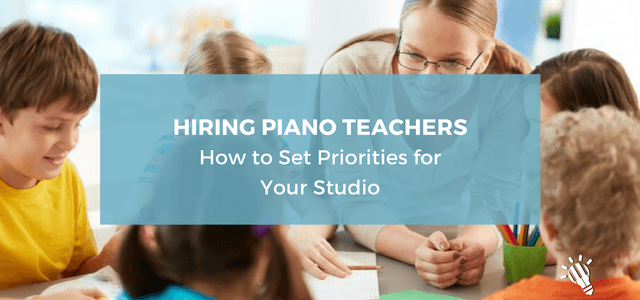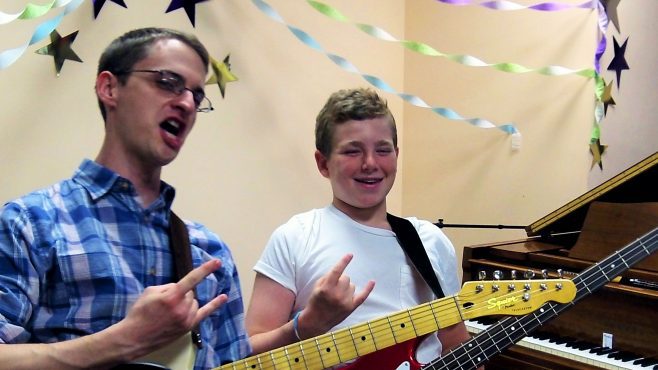
Today’s guest post is all about hiring piano teachers from Abraham Levitan of Piano Power, a big music school in Chicago that employs a team of teachers that teach in students’ houses.
Many teachers have dreams of building their own music academies and hiring other teachers to deliver their teaching method, but find they get stuck by the challenges involved.
Abraham has not only been hiring amazing teachers and building his school, he’s doing it with teachers working off-site and travelling to students’ homes. How he goes about hiring, nurturing and supporting his young, itinerant workforce is fascinating.
In my former life, I was an aspiring rock star who taught piano on the side. Driving house to house on Chicago’s North Shore, I happily delivered lessons until my client waiting list grew so long I considered hiring another teacher.
In 2007 I did just that, and Piano Power was born. Now some ten years later, we are 25 teachers, four admins (including me), and 400 students strong. We provide in-home lessons to mostly children – a great way to appeal to parents seeking convenience – so I’m careful to minimize driving time while maximizing teaching time.
As I hired teachers over the years, I assumed all music studios used my strategy: carefully match student and teacher, and focus intently on streamlining the teacher’s schedule.
But the more I interviewed candidates, the more I realized they were also interviewing at places that held a very different philosophy: what I call the “client-focused approach.”
Take this scenario. A client calls a music education provider and requests guitar lessons on Tuesdays at 4pm.
The client-focused business may respond with, “No problem! Read the bios of the plentiful teachers we have available at that exact time, decide who you want, and they’ll show up at your door.”
To have teachers “at the ready” like this, the business must overhire– or as I like to put it, they must grow a teacher farm. The abundance of the farm allows them to serve new clients immediately, which might seem great for the client…
But it’s not so great for teachers. As one of dozens or even hundreds of contractors, a teacher in this situation is typically sitting on their talented hands, waiting for their schedule to fill.
It’s easy to to see where this leads: low job satisfaction for teachers and high turnover.
Music students want to work with happy, motivated teachers who will be there for them– not jaded “jobbers”. Which is why a client-focused approach is ultimately bad for the client.
The relationship between teacher and student is so symbiotic that if a teacher is unhappy, chances are the student is, too.

The kind of teacher student relationship I like to see!
Conversely, a teacher-focused business prioritizes overall job satisfaction and happiness for the teacher. This is the only way I know how to take care of not only teachers, but clients.
How do I do this?

As I said earlier, accommodating my teachers’ desired schedules is top priority. Melding those schedules with clients’ desired lesson time is no easy feat.
If you’re interested in starting a small, in-home lessons studio, a passion for logistics and spreadsheets certainly helps–it may even be a requirement. I happen to be just that kind of nerd, so mapping efficient driving routes and matching schedules was always fun for me.
However, the volume of teachers and students eventually grew too high for me to do it on my own.
A few years ago I hired a logistics manager who carefully matches times and locations. She sends a list of proposed schedules to me, and ultimately I decide what works.
This way, rather than worrying about logistics, a teacher is handed a well-planned schedule, a roster of eager students, and a minimized amount of driving in their future.
Many of our teachers are young, working musicians who string together teaching, gigging, and other side jobs, so working with a company that grabs the scheduling reins is a huge relief.
Since our teachers work remotely, we have no centralized location for them to meet between lessons, share experiences and advice, and build rapport.
Consequently, I strive to create an espirit de corps among the teachers. Face time has always been important; I observe and give feedback on lessons regularly.
But my wife and I also throw parties for the gang. Twice a year we eat pizza, drink beer, listen to records, and nerd out on music talk.
We recently started performing for each other at “Piano Power Hour”, a live, monthly showcase that is open to the public at a local venue (the Hideout in Chicago, a local legend). It’s one thing to witness your teacher nailing it during a lesson, and a whole other to applaud them performing beautifully on stage.
I really do see the teachers as our team. I’m a big baseball fan, so I really like that we have roughly as many instructors as players on a major league baseball roster.
I enjoy the feeling that this is my crew and I’m looking out for them, deploying their talents as skillfully as I can.

Our teachers enjoying a backyard BBQ at our place.
On the client side, I get to know the student before they begin lessons. Most of our students are children, so I speak to their parents on the phone about experience levels, how they engage with music, personality characteristics, and learning styles.
From there, I hand-pick each student-teacher pair. If I can’t come back to the family and specifically explain why I think a teacher is a good fit based on our conversation, then I don’t do it.
When matching, I’m also considering the teacher’s preferences, like instrument, age range, and student experience level.
Granted, there are limits to how much you can learn about a student by simply taking with their parents. I do my best based on the initial consultation, but sometimes after a few lessons the parents decide it’s not a good fit.
I always defer to parental instinct in cases like that, never trying to “hard sell” a teacher. If the parents think it doesn’t work, we make another match.
If you’re interested in running a small, boutique operation, I see only one drawback to the teacher-focused approach. Namely, when a new client calls to request those guitar lessons on Tuesdays at 4pm, I’m much less likely to have an immediate solution for them.
Typically, they spend a small amount of time on a waiting list before we find a match, and that can be initially frustrating.

But I’ve always felt it was an indicator of health that our teachers are working full schedules, our families are happy and sticking around, and our teachers are doing the same. It makes us feel confident that because our reputation is strong, a new client is willing to wait a bit up-front to get matched with a great teacher.
At 400 students, Piano Power is bigger than I ever thought it would be, but that’s happened over ten years. Our growth does not mimic the “hockey stick model”– shooting up from the base at a steep incline.
Rather, our emphasis on quality over quantity has helped us achieve a slow, steady growth. And at the heart of that growth is a happy, satisfied group of teachers who know they’re my top priority.
Have you ever been a teacher in a “teacher farm”? What kind of studio do you run or want to run? Got any questions about how I run my school and hire teachers?
Let me know – I would love to read your comments below.

Regina says:
Building a tribe of teachers who place emphasis on the values you hold dear can be a challenge, but it is doable. For me it’s been about refining interview questions, speaking at length with some of the teacher’s current and former students, and keeping the lines of communication open and providing on-going training. Very time consuming, but absolutely worth it!
Rhonda Pigott says:
Hi, I appreciated your article. I have a small full studio with about a dozen people on my wait list. So…I’m considering hiring a second instructor to help me. I have someone in mind, she has the qualifications but has had no experience teaching. Is this a good idea? Second question…do you have a template or something of a contract I could adapt? Thanks for any help you can give me.
Anna says:
Hi Abraham, thanks for the great article! I have a small music school and a couple of teachers that I hired. Here’s the problem: I’ve noticed that one of the teachers contributes ( so to speak) to students quitting. Sometimes a parent student would ask the teacher if it makes sense to continue lessons if the child looses interest and the teacher would agree and go on about how it’s a waste of money if the student doesn’t practice so he/she as well might try another activity instead of music lessons. I tried to ask the teacher to find ways to regain students’ interest and after all, I’d hate to loose clients…how do I go about it? Thank you!
Marie Lee says:
Thanks, Abraham! I’m just starting to hire teachers and really appreciated reading about your approach. Question for you about how you use Facetime: Are the teachers videoing their lessons and you’re observing and giving feedback?
Abraham says:
Thanks for reading, Marie, and I hope the article helps! When I say “face time”, I mean the good old-fashioned, in-real-life face time. Every few months I “shadow” my instructors during their lessons so I can evaluate how things are going in person. I then give them very detailed feedback.
When training a new teacher, we shadow an experienced teacher together so we can discuss pedagogy, etc.
Thanks again for reading!